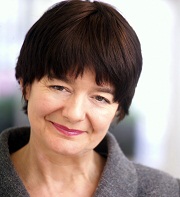Bridget Dolan QC – Serjeants’ Inn Chambers, London
 Bridget Dolan QC, who is one of the 25 women appointed to QC in 2015/16, was a forensic psychologist prior to her call to the Bar at the age of 34 (she studied eating disorders for her PhD). The move to the legal profession enabled Bridget to achieve a long-held ambition to combine the two careers, her interest in mental health law dating back to her undergraduate studies at Bradford University, where she achieved a first class degree in Psychology.
Bridget Dolan QC, who is one of the 25 women appointed to QC in 2015/16, was a forensic psychologist prior to her call to the Bar at the age of 34 (she studied eating disorders for her PhD). The move to the legal profession enabled Bridget to achieve a long-held ambition to combine the two careers, her interest in mental health law dating back to her undergraduate studies at Bradford University, where she achieved a first class degree in Psychology.
Bridget describes her expert specialist practice at the interface of law and mental health as being “anything concerning madness, injury or death.” Bridget appears in the Court of Protection and the High Court’s Family Division in complex cases involving significant issues regarding the capacity and best interests of adults with disabilities and children. She is sought after to act in serious, life and death decision making, medical treatment applications, where she is frequently instructed by the Official Solicitor. In her clinical negligence practice, Bridget’s special interest is in cases that involve allegations of psychiatric negligence or where physical injury has resulted in co-morbid psychiatric damage or ‘nervous shock’ to a secondary victim.
Bridget is also a specialist in Coronial Law, acting for families, NHS Trusts and other public bodies in high media profile Article 2 inquests. As well as representing parties in judicial reviews of coroners’ decisions, she also acts as counsel to the Inquest, most recently in the fresh inquest into the death of Private Cheryl James at Deepcut Barracks and, in 2014-15, in the inquests following the Al-Qaeda terrorist killings in Amenas, Algeria. Indeed, it was partly the latter case (“the biggest case of my career”) that prompted Bridget to apply for silk as it provided the keystone along with other substantial cases of the type the Selection Panel need to see. Bridget was being encouraged by her Head of Chambers to apply for silk and when two women colleagues, with whom she appeared regularly in court, were appointed Queen’s Counsel the year before she realised the time was right.
As to preparing for the QC Competition, Bridget recommends talking to people who have been through the process recently, to “demystify it”. She says that being of a generation who are unfamiliar with the evidence-based approach to appointments should not put you off. “That is how the world works now – talk to any teenager who is doing their university personal statements” she suggests, “they get it.” You have to learn to not be bashful about selling yourself. Bridget did a few practice interviews, which she found “absolutely invaluable”. She then had a much better understanding of what she needed to do. As to the QC Selection Panel interview itself, Bridget says she found this “challenging but stimulating”. She says she had a “delightful” Panel pair interviewing her – “their style was great” and helped her give of her best.
In hindsight the whole application process was “not so bad as it seemed” though when you are in the middle of it can seem “a bit gruelling”, she says. Bridget did not find any particular competency harder than others to enunciate to a level of excellence – “they all seem hard when you first look at the blank form”, she said! Finding evidence for the diversity competency was easy for Bridget who has been pushing an equality agenda since she started as a pupil in 1997 and was shocked at how far the Bar then lagged behind the NHS in promoting equality. Applicants had nothing to fear from that competency she said “so long as they have a genuine commitment to increasing diversity and have actually done something about it”. She suspects the Panel will see through those whose commitment to diversity started six months before their application.
For anyone contemplating a career as an advocate, Bridget cautions, “don’t embark on it unless you are pretty sure you will love it.” She says it is tough: besides drawing on her advocacy and legal skills, Bridget has to marshal strong inter-personal, almost counselling, skills when dealing with clients in highly distressing circumstances such as at inquests. She gets great satisfaction from this aspect, but it can be emotionally demanding. In addition, the impact on your private life of the profession cannot be over-stated. Bridget started her family three years after she was called to the Bar, and looking back she says that this was only possible with the support of an extremely understanding partner and supportive clerks who enabled Bridget to have a predominantly paper-based practice early on.
As to having the QC ‘badge’, Bridget said it was bitter-sweet in some ways in that by doing bigger and longer cases she may not be seeing so much of some of her solicitor clients in future, and she would miss the regular contact with them. On the plus-side she joked that she hoped to “now at least take the whole of the summer off and see my children!”
© Queen’s Counsel Appointments Ltd
- Date: March 25, 2019
- Category: QCA Profiles 2016


